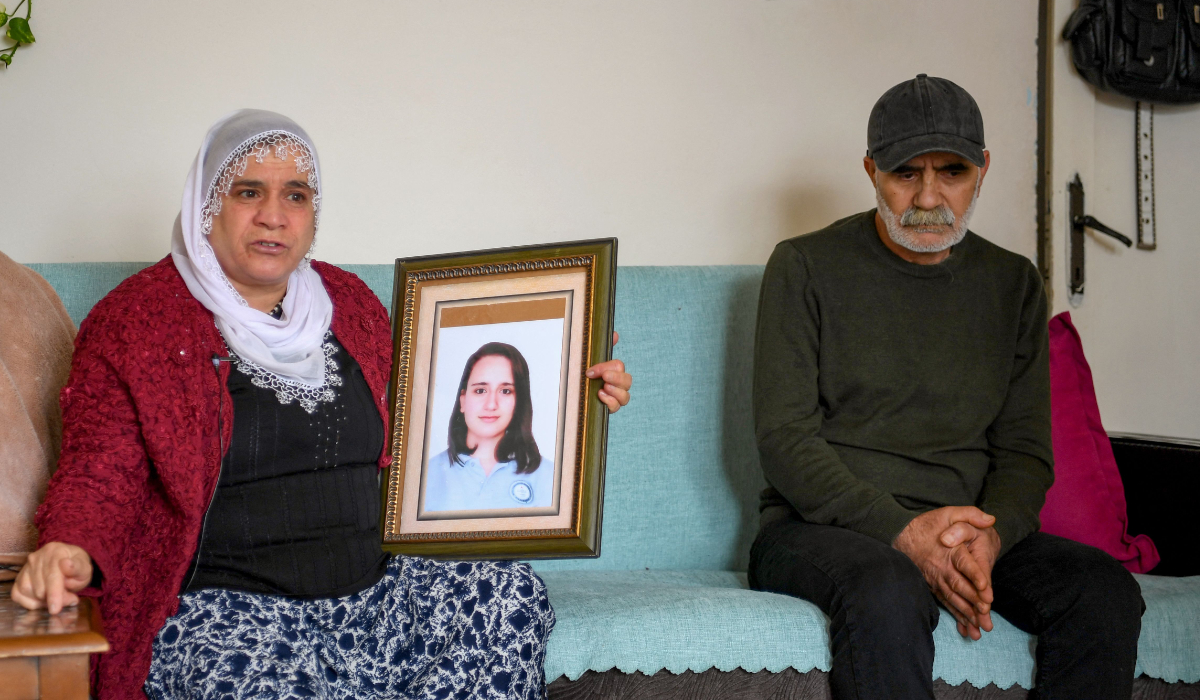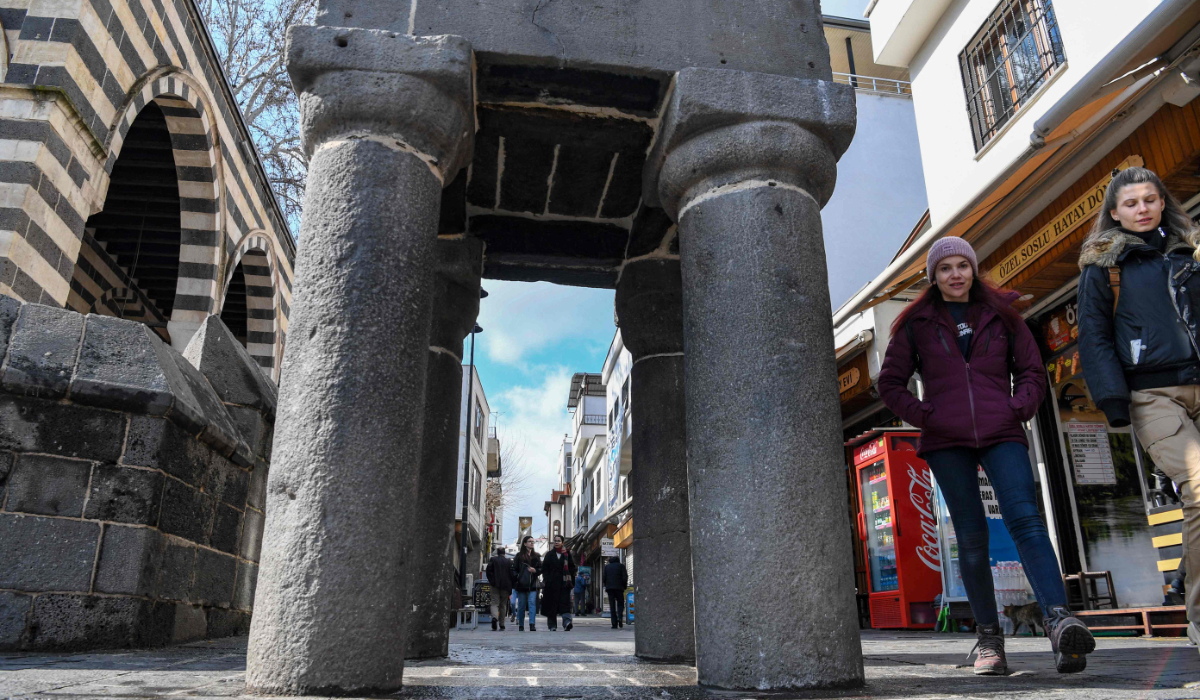LONDON: As schoolchildren around the globe prepare their backpacks for the new academic year, more than half a million pupils in Palestine’s embattled Gaza Strip face a second year in a row without an education.
Over the past year, some 625,000 children in Gaza have been deprived of schooling, according to the UN children’s fund, UNICEF. With little prospect of a permanent ceasefire, they are unlikely to return to schools this month.

August alone saw attacks on eight schools in Gaza City, killing more than 179 Palestinians and causing significant damage. (AFP)
Amal, whose name has been changed at her request, has been teaching her two children, aged 7 and 10, in their temporary shelter in Rafah. However, she says repeated exposure to traumatic events and the lack of stability have disrupted their learning.
“How can a child remember lines of poetry after a night of bombardment, screams and trembling?” Amal told Arab News. “Even our adult brains are faltering amid this chaos. How can a child learn and grow with an empty stomach and when their friends are likely to die any minute?”
The Hamas-led Oct. 7 attack on southern Israel, which saw more than 1,100 killed and 250 taken hostage, triggered the Israeli offensive in Gaza, which has killed at least 40,700 people, 16,500 of them children, according to local health authorities.
Thousands more Gazan children remain missing, presumed buried under the rubble, while more than 12,000 have been injured — at least 1,000 of them having undergone leg amputations.
Those who have survived have been left without a safe place to learn or the means to return to education. The Global Education Cluster, co-led by UNICEF and Save the Children, estimates that as of March 30, some 87.7 percent of school facilities in Gaza had been destroyed.

Over the past year, some 625,000 children in Gaza have been deprived of schooling. (AFP)
According to the cluster, which made a damage assessment using satellite imagery, direct Israeli strikes have severely damaged 212 of the enclave’s schools and caused moderate to minor damage to a further 282.
Some 70 percent of the schools operated by the UN Relief and Works Agency have also suffered damage. However, since October, around 95 percent of these schools have been transformed into shelters for displaced households.
Attacks on schools are deemed a grave violation of children’s rights and are prohibited under international humanitarian law.
Israeli authorities have insisted they do not target civilians or civilian infrastructure, instead accusing Hamas of using schools and hospitals as command centers from which to launch attacks and using their occupants as human shields.
In August, the UN Office of Internal Oversight Services concluded that nine UNRWA staff members may have been involved in the Oct. 7 Hamas-led attack, while the records of 10 others are still being reviewed.
UNRWA employs 32,000 people across its area of operations — 13,000 of them in Gaza. The UN launched the investigation after Israel said in January that 12 UNRWA staff had taken part in the Oct. 7 attack. Seven more cases were brought to the UN’s attention in March and April.

Israeli strikes have severely damaged 212 of the enclave’s schools and caused moderate to minor damage to a further 282. (AFP)
The allegations against UNRWA led several major donor nations, including the US, to suspend funding for the agency, undermining relief efforts not only in Gaza and the West Bank but throughout the Middle East region where Palestinians hold refugee status.
In April, UN experts led by Farida Shaheed, the special rapporteur on the right to education, expressed concern about what appeared to be the systematic destruction of Gaza’s education system — already weakened by Israel’s 17-year embargo on the enclave.
“With more than 80 percent of schools in Gaza damaged or destroyed, it may be reasonable to ask if there is an intentional effort to comprehensively destroy the Palestinian education system, an action known as ‘scholasticide,’” the experts said in a joint statement.
Scholasticide involves the organized destruction of the educational infrastructure and the killing of students, teachers and staff.
Gaza’s Ministry of Education said in August that at least 500 teachers had been killed in the hostilities, while more than 3,000 were injured.

Thousands more Gazan children remain missing, presumed buried under the rubble, while more than 12,000 have been injured. (AFP)
The UN experts said they believe the Israeli attacks on Gaza’s schools “are not isolated incidents” but part of “a systematic pattern of violence aimed at dismantling the very foundation of Palestinian society.”
August alone saw attacks on eight schools in Gaza City, killing more than 179 Palestinians and causing significant damage.
The deadliest of these strikes was on Al-Tabin School in Gaza City on Aug. 10. CNN confirmed that a US-manufactured GBU-39 small-diameter bomb was used in the attack, killing more than 100 of the roughly 2,400 Palestinian refugees sheltering there.
In a post condemning the attack on the social media platform X, UNRWA chief Philippe Lazzarini said: “Schools, UN facilities and civilian infrastructure are not a target.”
Calling for an immediate ceasefire, he wrote on the day of the attack: “Parties to the conflict must not use schools and other civilian facilities for military or fighting purposes.

At least 1.9 million of Gaza’s 2.2 million-strong population have been displaced. (AFP)
“It’s time for these horrors unfolding under our watch to end. We cannot let the unbearable become a new norm. The more recurrent, the more we lose our collective humanity.”
To provide children with a shred of normality and respite from the daily horrors of the conflict, UNICEF and its partners in the Palestinian enclave have set up 48 learning tents in Khan Younis, the Middle Area, Gaza City and North Gaza.
The temporary spaces provided informal learning activities and mental health support to some 15,000 school-age children in July.
INNUMBERS
• 625,000 Children in Gaza deprived of an education since October 2023.
• 87.7% Schools damaged or destroyed by Israeli strikes across Gaza.
(Source: UNICEF, Global Education Cluster)
But despite the efforts of humanitarian organizations to offer temporary learning opportunities for Gaza’s children, the absence of a permanent ceasefire, repeated displacement, decimated infrastructure, and extremely limited access to basic necessities such as food, clean drinking water, and healthcare have hindered their ability to develop normally.
Tedros Adhanom Ghebreyesus, director-general of the World Health Organization, underlined in June that more than 8,000 children in the embattled enclave have been diagnosed with acute malnutrition.
The WHO chief warned that “a significant proportion of Gaza’s population is now facing catastrophic hunger and famine-like conditions.”

The international community has accused the Israeli government of using the starvation of civilians as a weapon of war. (AFP)
More than 34 people, at least 28 of them children, have already died from severe malnutrition, Gaza’s health authority reported in late June.
The international community has accused the Israeli government of using the starvation of civilians as a weapon of war.
In May, the International Criminal Court’s prosecutor Karim Khan requested arrest warrants for Israel’s Prime Minister Benjamin Netanyahu and Defense Minister Yoav Gallant, accusing them of deliberately starving civilians.
The Israeli government has repeatedly denied the accusations. However, high-ranking officials, including Gallant himself, publicly stated their intention to deprive civilians in Gaza of food, water and fuel at the outset of the conflict last year.
At least 1.9 million of Gaza’s 2.2 million-strong population have been displaced — many of them multiple times — as the Israeli military has evacuated Palestinian families from one “safe zone” to another. In the process, children have been deprived of the stability required for learning.

Gaza’s Ministry of Education said in August that at least 500 teachers had been killed in the hostilities, while more than 3,000 were injured. (AFP)
Save the Children warned in April that “when children are out of school for a long period, their learning does not just stop but is also likely to regress. We know from previous crises that the longer children are out of school, the greater the risk that they do not return.
“This risks their prospects in the longer-term, including their income, and their mental and physical health, while they may also be at greater risk from violence and abuse.”

































